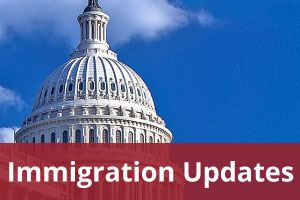USCIS Issues Final Immigration and Naturalization Fee Rule Effective April 1
 Important Update: We wish to clarify an important aspect regarding the USCIS final fee rule’s exemptions/reduced fees for nonprofit organizations. The rule specifies that the exemption/reduced fees apply to entities classified under the 501(c)(3) category, as per the Internal Revenue Code. This classification may not encompass many public universities and colleges, which, while tax-exempt, are generally not designated as 501(c)(3) organizations. We are aware of the confusion this may cause within the higher education community and are working with other higher education associations to seek clarification from USCIS.
Important Update: We wish to clarify an important aspect regarding the USCIS final fee rule’s exemptions/reduced fees for nonprofit organizations. The rule specifies that the exemption/reduced fees apply to entities classified under the 501(c)(3) category, as per the Internal Revenue Code. This classification may not encompass many public universities and colleges, which, while tax-exempt, are generally not designated as 501(c)(3) organizations. We are aware of the confusion this may cause within the higher education community and are working with other higher education associations to seek clarification from USCIS.
On January 31, 2024, U.S. Citizenship and Immigration Services (USCIS) issued a final rule to adjust certain immigration and naturalization benefit request fees, resulting in significantly higher fees for employment-based petitioners, with notable reductions and exemptions for certain higher education employers. USCIS claims that the increased fees, which will apply to any benefit request postmarked on or after April 1, 2024, will “allow USCIS to recover a greater share of its operating costs and support more timely processing of new applications.”
Background
Unlike other government agencies that receive the majority of their funding through congressional appropriations, USCIS receives approximately 96 percent of its funding from filing fees. The agency, after its last fee adjustment in 2016, conducted a fee review that revealed these fees were inadequate to meet the agency’s operating costs. This assessment led USCIS to issue a notice of proposed rulemaking (NPRM) in January 2023, which included substantial increases to various employment-based filing fees, including up to 200 percent increases for some petitions. In response to the proposal, CUPA-HR joined comments which addressed higher ed-specific concerns with the proposal including the impact the increased fees would have had on international scholars and institutions’ ability to hire nonimmigrant workers, including H-1B workers.
Final Rule Details
While the final rule is nearly 330 pages long and has significant implications for both employment-based and family-based filings, this blog post focuses on the notable changes from the proposed rule to the final rule that have the most significant implications for higher ed employers.
The proposed rule introduced a new fee to fund the Asylum Program with employer petition fees. The fee is $600 to be paid by any employer who files either a Form I-129, Petition for a Nonimmigrant Worker, or Form I-140, Immigrant Petition for Alien Workers. In the latest rule, USCIS finalized this fee but exempted the Asylum Program Fee for nonprofit petitioners that meet the Internal Revenue Code’s specific 501(c)(3) classification, resulting in a $0 fee for those entities. While the comments CUPA-HR signed onto requested that higher ed be exempt from the fee, based on precedents like the American Competitiveness and Workforce Improvement Act of 1988, which exempted certain fees for colleges and universities, there is confusion regarding this exemption’s applicability to some public universities and colleges, as many do not fall under the 501(c)(3) classification.
In addition to the new Asylum Program Fee, USCIS is implementing the following changes to employment-based and employment-based “adjacent” filing fees:
- Fee changes for visa classifications on Form I-129 and Form I-140: USCIS is imposing different fees for each visa classification sought on the Form I-129 nonimmigrant worker petition, replacing the uniform $460 Form I-129 filing fee across all classifications.
- Fees for I-129 Petitions for H-1B workers: USCIS had proposed a 70 percent increase in the filing fee, from $460 to $780. In the final rule DHS did not increase the filing fee for nonprofits so it is still $460 (0 percent increase).
- Fees for I-129 Petitions for L-1 workers: USCIS had proposed a 201 percent increase from $460 to $1,385. In the final rule USCIS set the fee for nonprofits at $695 (51 percent increase).
- Fees for I-129 Petitions for O-1 workers: USCIS had proposed a 129 percent increase, from $460 to $1,055. In the final rule USCIS set the fee for nonprofits at $530 (15 percent increase).
- A full fee schedule can be found in Table 1 of the preamble to the final rule.
In addition to the aforementioned changes, USCIS finalized its proposal to revise the premium processing timeframe interpretation from calendar days to business days. Currently, premium processing allows petitioners to receive an adjudicative action on their case within 15 calendar days. Changing the interpretation to business days will add nearly a week to the existing adjudication time.
Update on Clarification Efforts by Higher Education
In response to the USCIS final fee rule’s reliance on the Internal Revenue Code’s definition of a nonprofit organization, specifically 26 U.S.C. 501(c)(3), higher education associations are actively seeking clarification from USCIS. These efforts aim to understand how the fee adjustments will impact public universities and colleges that do not fall under the 501(c)(3) classification. The goal is to ensure that the unique status of higher education institutions is recognized and adequately addressed in the implementation of the fee rule.


